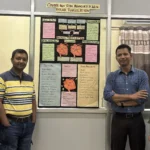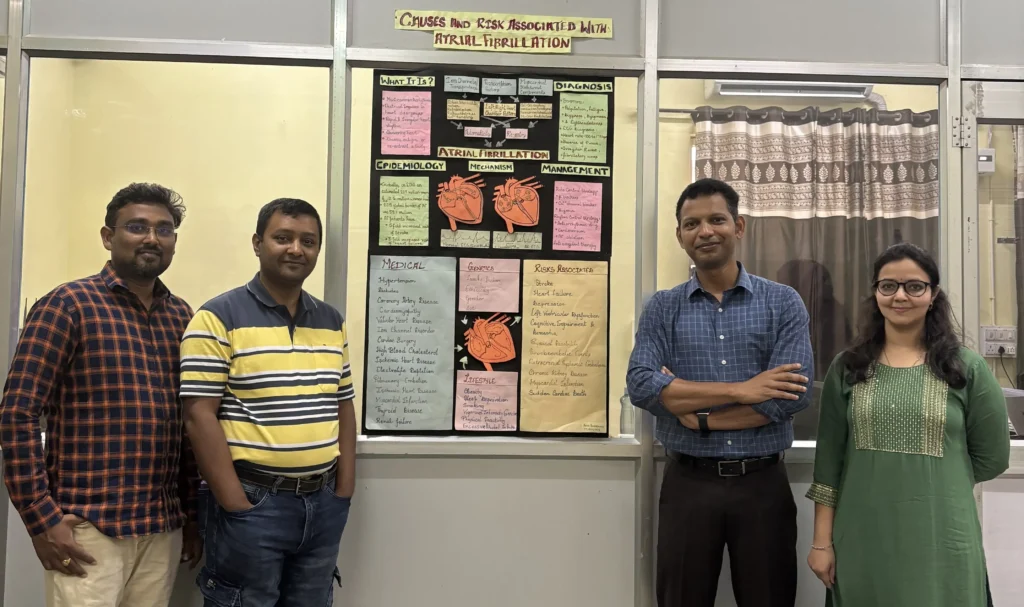ArdorComm Media
May 16, 2025
The system is compatible with ECG machines enabling hospitals and clinics to upgrade the existing equipment at no additional cost
ROURKELA, 15th May 2025: National Institute of Technology Rourkela (NIT Rourkela) Researchers have developed an effective upgrade to Electrocardiography (ECG), one of the most commonly used techniques to monitor heart activity. This new system helps in easily detecting subtle electrical signals from the upper chambers of the heart, which are often too indistinct to be seen clearly in regular ECGs. These signals play a key role in identifying abnormal heart rhythms that can lead to serious conditions such as atrial fibrillation which can further lead to stroke.
Irregular heart rhythms, or arrhythmias, are responsible for a large number of cardiac-related deaths around the world. Irregular heart rhythm in the heart’s upper chambers, known as atrial arrhythmias, are among the most common, especially in patients who have been hospitalised. Identifying these arrhythmias in early state can help doctors begin timely treatment and prevent complications.
An ECG records the electrical activity of the heart using electrodes placed on the body. In an ECG, doctors check the ‘P-wave’, which reflects the electrical activity in the upper chambers of the heart. However, P-waves are often small and easily lost in background noise or obscured by stronger signals from other parts of the heart. As a result, detecting atrial arrhythmias can sometimes be difficult, particularly in busy clinical settings or with low-cost monitoring equipment.
To address this challenge, NIT Rourkela research team has designed novel lead placement system called the Atrial Lead System (ALS). In an ECG, leads refer to specific patterns of electrical measurement created by placing electrodes on different parts of the body. Lead placement involves positioning these electrodes to capture clear signals from the heart. The ALS uses a modified arrangement to improve how electrical activity from the atria is recorded. By strengthening these signals, especially the P-wave, the system helps improve the accuracy of arrhythmia detection, both by doctors and by computer-based diagnostic tools.
Speaking about the research, Dr. J. Sivaraman, Research lead, and Assistant Professor, Department of Biotechnology and Medical Engineering, NIT Rourkela, said, “We introduced novel electrode placements that significantly increased the visibility of atrial activity on ECG readings. The improved signal clarity allows for quicker analysis and better clinical decision-making.”
One of the most promising aspects of this work is that it requires no change to the ECG machine itself. The innovation lies entirely in the way the leads are placed, which means the upgrade can be easily adopted in both public and private healthcare settings without additional cost.
Highlighting the clinical importance of the research, Dr. R. Pradeep Kumar, Institute of Cardiac Care, MIOT International, Chennai, said, “A clearly appreciated P wave in ECG gives a clue to the diagnosis of atrial pathology. To distinguish atrial fibrillation from other supraventricular arrhythmias, P wave morphology needs to be taken into consideration.”
The research was led by Dr. J. Sivaraman, Dr. N. Bala Chakravarthy and Prof. Kunal Pal along with research scholars, Mr. Prasanna Venkatesh and Ms. Arya Bhardwaj, from NIT Rourkela, with clinical collaborations and validation provided by Dr. R. Pradeep Kumar, Senior Interventional Cardiologist, MIOT International Hospital, Chennai, and visiting consultant at Jaiprakash Hospital and Research Centre, Rourkela.
Additionally, findings of this broader research have been published in international journals including Biomedical Signal Processing & Control, Medical Hypotheses, and Physical & Engineering Sciences in Medicine.
The research team has also filed a patent application for the Atrial Lead System. (Application No. 202431094709). The project has received financial backing from the Anusandhan National Research Foundation (ANRF), Government of India.
This collaborative achievement by NIT Rourkela, MIOT International, Chennai, and Jaiprakash Hospital, Rourkela, represents the impactful synergy between academic research and clinical practice, paving the way for significant advancements in cardiac diagnostics and patient care across India and beyond.
Disclaimer: This report is generated from PR/ PRO services. ‘ArdorComm Media’ holds no responsibility for its content.


